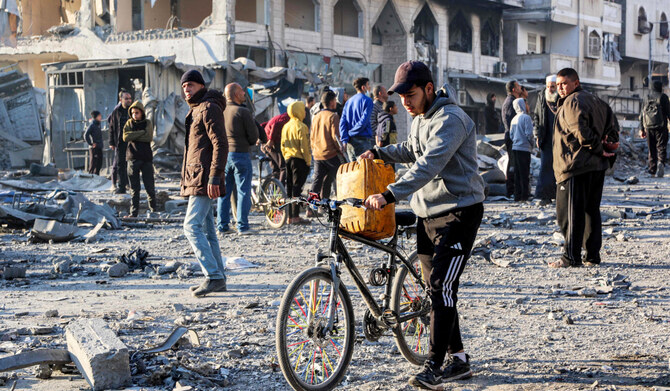TEL AVIV, Israel: Israel is already in a “multi-front war” with Iran and its proxies, Israeli Prime Minister Benjamin Netanyahu told a Cabinet meeting Sunday, as the United States and allies prepared to defend Israel from an expected counterstrike and prevent an even more destructive regional conflict.
Tensions have soared following nearly 10 months of war in Gaza and the killing last week of a senior Hezbollah commander in Lebanon and Hamas’ top political leader in Iran. Iran and its allies have blamed Israel and threatened retaliation. Hamas says it has begun discussions on choosing a new leader.

A Palestinian man carries a wounded girl at the site of an Israeli strike on a school sheltering displaced people, amid Israel-Hamas conflict, in Gaza City, in this still image taken from a video August 4, 2024. (REUTERS)
Netanyahu said Israel was ready for any scenario. Jordan’s foreign minister was making a rare trip to Iran as part of diplomatic efforts — “We want the escalation to end,” Ayman Safadi said — while the Pentagon has moved significant assets to the region.
“We are doing everything possible to make sure that this situation does not boil over,” White House deputy national security adviser Jon Finer told ABC.

Palestinians inspect the site of an Israeli strike on a house, amid the Israel-Hamas conflict, in Deir Al-Balah in the central Gaza Strip, August 4, 2024. (REUTERS)
In Israel, some prepared bomb shelters and recalled Iran’s unprecedented direct military assault in April following a suspected Israeli strike that killed two Iranian generals. Israel said almost all the drones and ballistic and cruise missiles were intercepted.
A stabbing attack on Sunday near Tel Aviv killed a woman in her 70s and an 80-year-old man, according to Israel’s Magen David Adom rescue service, and two others were wounded. The police said the attack was carried out by a Palestinian militant, who was “neutralized.”

Flares of the Israeli army light up the sky of the area bordering Lebanon on August 3, 2024, amid ongoing cross-border clashes between Israeli troops and Lebanon's Hezbollah fighters. (AFP)
Inside Gaza, the Health Ministry said at least 25 people were killed and 19 others injured when Israel struck two schools in Gaza City. AP video showed at least one child among the dead. Israel’s military, which regularly accuses Palestinian militants of sheltering in civilian areas, said it hit Hamas command centers.
“As you can see, there is no equipment to recover the injured. Rescuers are digging with their hands,” said one man, Yusuf Al-Mashharawi.
Earlier, Israeli strikes killed at least 18 people. One hit a tent camp for thousands of displaced Palestinians in the courtyard of Al-Aqsa Martyrs Hospital, killing four people, including one woman, the Health Ministry said. The Israeli military said it targeted a Palestinian militant in the strike, which it said caused secondary explosions, “indicating the presence of weaponry in the area.”

Iranian president Masoud Pezeshkian (R) welcoming Jordan's foreign minister Ayman Safadi ahead of their meeting in Tehran on August 04, 2024. (AFP)
The hospital in Deir Al-Balah is the main medical facility operating in central Gaza as many others in the territory no longer function. A separate strike on a home near Deir Al-Balah killed a girl and her parents, according to the hospital.
Another strike flattened a house in northern Gaza, killing at least eight, including three children, their parents and their grandmother, according to the Health Ministry. Another three people were killed in a strike on a vehicle in Gaza City, according to Civil Defense first responders.
Palestinian militants in Gaza fired at least five projectiles at Israeli communities near the border without causing casualties or damage, the military said. The military later told people in some parts of the southern Gaza city of Khan Younis to evacuate.

People stand near their luggage at the Beirut-Rafic Al Hariri International Airport, in Beirut, Lebanon August 4, 2024. (REUTERS)
The Health Ministry also said an Israeli strike on Saturday at a school-turned-shelter in Gaza City killed at least 16 people. Israel’s military said it struck a Hamas command center.
The war in Gaza was triggered by Hamas’ Oct. 7 attack into Israel that killed some 1,200 people, mostly civilians, and took around 250 people hostage.
Israel’s massive offensive in response has killed at least 39,580 Palestinians, according to Gaza’s Health Ministry, which does not distinguish between civilians and combatants. Heavy airstrikes and ground operations have caused widespread destruction and displaced the vast majority of Gaza’s 2.3 million people, often multiple times.
The militant group Hezbollah and Israel have continued to trade fire along the Lebanon border since the war began, with the severity growing in recent months. The Lebanese state-run National News Agency said an Israeli strike targeted a house in Beit Lef, and the Lebanese Health Ministry said two people were critically wounded.
Hezbollah says it’s aimed at relieving pressure on fellow Iran-backed ally Hamas. A growing number of countries, including the US, are encouraging citizens to leave Lebanon after last week’s killing of a senior commander.




























